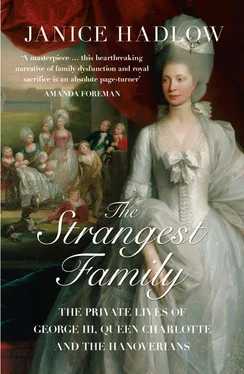Having dealt with the most pressing threat to her family’s security, she proceeded to manage her father-in-law too. When he arrived at Leicester House, ‘she received him alone, sitting with her eyes fixed: thanked the king much, and said she would write as soon as she was able; and in the meantime, recommended her miserable self and children to him’. 45Always pleased to be treated with the respect he thought he deserved, the king warmed to her submission, as she must have known he would. ‘The king and she both took their parts at once; she, of flinging herself entirely in his hands, and studying nothing but his pleasure; but minding what interest she got with him to the advantage of her own and the prince’s friends.’ 46When she heard that the king had decided to allow George to stay with her, she did not forget to write and tell him how thankful she was.
Although Augusta was astute enough to have kept hold of her son, she had no idea what to do with him once she had him. She had no vision for his development, no sense of how best to equip him to face his destiny with confidence. She was not a strategic thinker; without imaginative leadership, Augusta’s instincts were always defensive. She had neither the desire nor the capacity to forge alliances or build networks of friendship and support for her son. Hers was an inward-looking nature, suspicious of those she did not know and habitually secretive. Dodington, who came to know her very well, thought the defining quality of her character was prudence, ‘not opening herself much to anybody, and of great caution to whom she opens herself at all’. 47As a result, her motives were often opaque, and her true feelings more so. Lord Cobham thought her ‘the only woman he could never find out; all he discovered about her was that she hated those she paid court to’. 48
If she was an enigma, she was an increasingly sombre one. No longer obliged to accompany Frederick into the wider world, she quickly lost the habit of pleasure; she went nowhere and saw no one. But she did not appear to miss the life that had been taken from her with such cruel suddenness. Instead, she seemed to relish the opportunity to dispense with the trappings of her old existence, and emerge as a sober woman of early middle age, unencumbered now by the obligation to please or conciliate anyone but herself. Nothing illustrates more starkly the gulf between these two versions of Augusta than two contrasting portraits. In 1736, she was painted in a conventionally fashionable pose. Overwhelmed by the stiff ornateness of her dress, she is a tiny doll-like figure, rigid and stranded in the gloom of an oppressive grey interior. Of her personality, there is no sense at all. In 1754, when Augusta chose her own artist, the result could not have been more different. Jean-Etienne Liotard’s portrait is not an image designed to flatter. Augusta is simply dressed; she wears no jewellery, and her hair is pulled back sharply from her forehead. Its defining quality is its cool candour. Augusta’s gaze is wary; her whole posture suggests a guarded, watchful reticence. She does not seem a woman eager for enjoyment or delight; and it is perhaps possible to read in her expression a hint of the debilitating combination of anxiety and suspicion with which she came to view the world in the long years of her widowhood.
These were not the happiest qualities on which to build a family life, and it must have been quickly apparent to Augusta’s children that, as the halo of their father’s warmth and sociability dimmed, their world grew inexorably chillier. The amateur theatricals, the compulsory team sports, the trips and treats and jokery, the noise and lively bustle of their father’s daily round all gradually ebbed away. They were replaced by a carefully cultivated seclusion, in which all the pleasures were small ones.
One of the few people allowed to intrude into this increasingly remote and withdrawn existence was George Dodington, whom Augusta adopted as chief confidant after her husband’s death. A much-tried member of Frederick’s entourage, Dodington’s greatest asset was his understanding of the practical business of politics, drawn from a lifetime of holding office and the management of parliamentary interests, although he had many other sterling qualities: he was loyal, witty and humane, an ugly man with a complicated love life and a naive enthusiasm for extravagant grandeur. Walpole described his house in Hammersmith as a monument to rich, bad taste, crammed full of marble busts and statues, and dominated by a fireplace decorated with marble icicles. It is not hard to see why Frederick, with his predilection for the eccentric, should have enjoyed his company. That Augusta too soon came to value and rely upon him is further testament to her carefully concealed political acumen. Beneath his unprepossessing exterior, Dodington nurtured a sharp mind and a wealth of experience. He was an excellent ally for a woman who believed herself more or less friendless, a seasoned adviser who could help her navigate her way through the difficulties that lay ahead. Perhaps Augusta also recognised in him some of the warmth and conviviality that was in such short supply elsewhere in her household.
Dodington clearly missed his late patron’s relaxed expansiveness. He often struggled to penetrate Augusta’s ingrained reticence, but did all he could to support and encourage her. He recorded his somewhat stuttering progress in his diary, a rueful chronicle of his efforts to persuade Augusta to adopt what he saw as politic courses of action. It was not an easy task. He soon saw there was no chance at all that Frederick’s death might have opened the way for a serious reconciliation with the rest of the royal family. Beneath the blandly compliant surface she presented to her in-laws throughout her married life, Augusta hid a settled dislike and disrespect for all her Hanoverian relations which was evident from the earliest days of her widowhood. In 1752, she and Dodington were enjoying a gossip about the Dorset family. Dodington opined that ‘there were oddnesses about them that were peculiar to that family, and that I had often told them so. She said that there was something odd about them, and laughing, [she] added that she knew but one family that was more odd, and she would not name that family for the world.’ 49It was a rare moment of playfulness – and the only instance of Augusta’s laughter in the whole of Dodington’s diary. Her antipathy was usually expressed with far greater resentment, seen most starkly in her attitude to the king. As Frederick’s wife, she had shared in all the humiliations that had been heaped upon him by his father; then, for over a decade, she had witnessed all her husband’s attempts to harass and embarrass George through the medium of politics. Her husband’s hostility and suspicion had defined her attitude to her father-in-law for twenty years, and continued to do so long after he was dead.
Augusta knew these were views that could have no outward expression. She told Dodington she fully understood ‘that, to be sure, it was hers and her family’s business to keep well with the king’. 50In public, she assiduously cultivated the role of dutiful daughter-in-law, obedient and tractable; but in private, she had nothing but contempt for her father-in-law. She was bitterly angry that George had refused to settle Frederick’s debts, which she considered a slight to his posthumous reputation, and furious when he refused to release to her the revenues from the Duchy of Cornwall that he had claimed for himself after the prince’s death. As she described how she had berated and harangued the king on the vexed subject, Dodington’s politician’s spirits sank; he was not surprised to hear that George rarely visited now. His absence did nothing to make Augusta’s heart grow fonder. Over a period of six months, Dodington heard her speak favourably of the king only once, and considered it so remarkable that he made a special note of it.
Читать дальше












